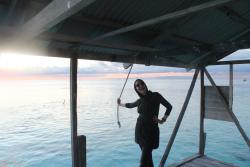
Fadwa's recent work has focused on working with local youth concerned with protecting the forest habitat, wildlife, and biodiversity of the Lower Kinabatangan, Sabah, while preserving the livelihood of the local population. The Kinabatangan is the longest river in Sabah, Borneo, Malaysia traveling 350 miles down to its mangrove swamp estuary into Sulu sea on the East coast of Sabah. The Kinabatangan River provides a unique and rich ecosystem of wildlife; it is acknowledged by experts to be the most diverse and easily accessible wildlife in all of Southeast Asia. Aside from gathering her thesis data, Fadwa and her Graduate Reseach Team collaborated with The MESCOT Initiative, founded by the local indigenous people. She has trained youth in basic quality assurance techniques such as utilizing pH, soil moisture probes, and water quality analysis. With her Environmental Department at USF (University of San Francisco) and KOPEL, she aims to foster a long-term training opportunity by initiating Forest Habitat Restoration and Lake Restoration practices.
When she's not in the midst of a tropical rainforest, she also finds the opportunity to put her environmental knowledge into conservation efforts! As a Natural Resource and Community Ambassador for the National Park Service, she works with the Pacific West Region as a park liaison to ensure parks around the country are expanding in service and implementing conservation practices. This work includes everything from coordinating data inventory to facilitating workshops and hosting hands-on service project associated with national stewardship events (i.e.Earth Day, National Trails Day, National Public Lands Day, Martin L. King Day of Service). As a first generation, Muslim-American, she takes pride in the service she commits to the Park service along with the privilege to connect people to parks.
As an Oakland native, Fadwa is also fascinated by coastal land and water management, freshwater resource usage, and how climatic variation will affect water quality in North Africa and California. As a previous intern of the U.S Department of the Interior, as well as a National Park Service Fellow, Fadwa has utilized conservation tactics and GIS to conduct projects related to coastal health, toxicology, and harmful algal blooms. She is currently tackling her master's thesis research, which will focus on the coastal vulnerability of marine and estuarine populations due to water quality issues in the upcoming century. Fadwa enjoys hiking, lattes, and anything National Geographic related, and she always loves a good Attenborough documentary.